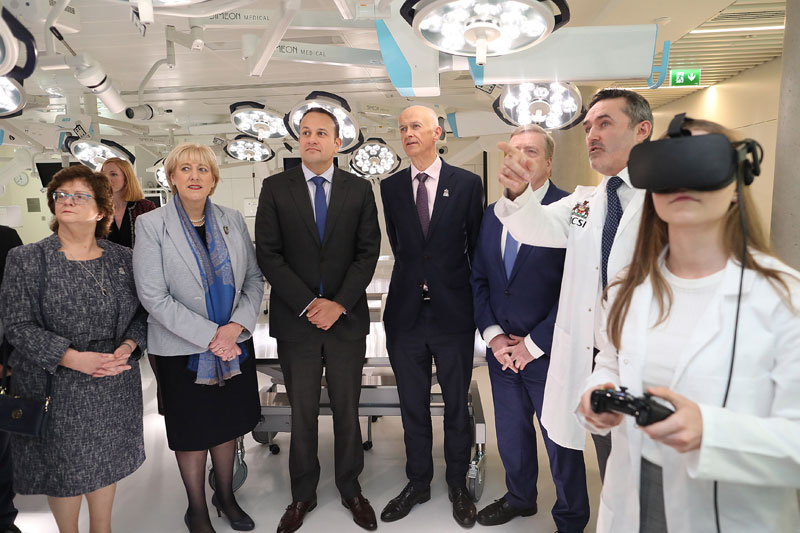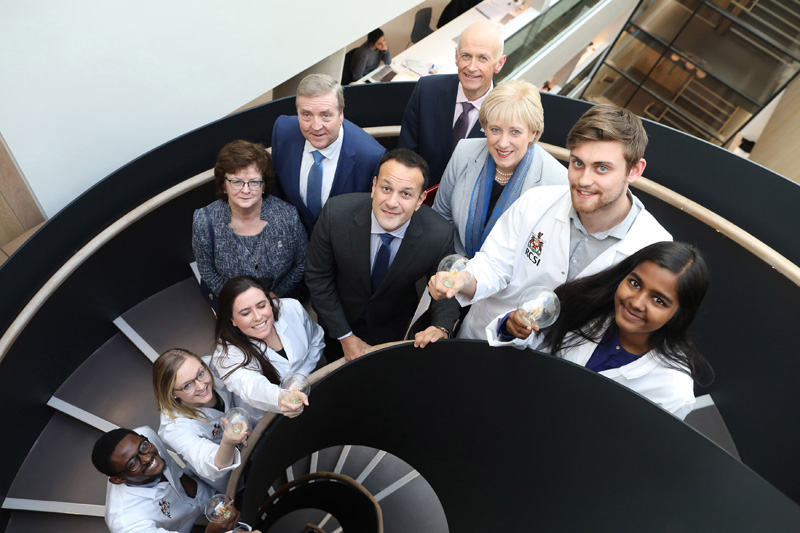10th December 2018
Collaborative projects include household electricity generation, sepsis treatments, coastal flooding supports & medical 3D printing
Project Ireland 2040 fund allocating €500m over next 10 years
Key element of Government’s ‘Future Jobs’ initiative
An Taoiseach, Leo Varadkar TD, Minister for Business, Enterprise and Innovation, Heather Humphreys TD have unveiled the 27 innovative projects who are sharing over €75 million in funding out to 2021 under the first tranche of the Disruptive Technologies Innovation Fund.
They include a scheme to help communities generate their own electricity, new treatments for sepsis, a support system for coastal flooding and advanced 3D printing of medical implants.
27 projects from sectors like life sciences, medical devices, ICT, manufacturing, food, agriculture, energy sustainability and the creative industries made successful applications for this first round of funding. All include collaborations between start-ups, SMEs, multinationals and academic institutions. Every project involves at least one SME and many are led by an SME. Over the next ten years some €500 million will be allocated through the fund, which was announced as part of Project Ireland 2040.
The projects can use the funding to develop and deploy their disruptive innovative technologies on a commercial basis. The Fund is a key part of the Government’s ‘Future Jobs’ initiative, a new whole-of Government plan to secure Ireland’s economic success, starting in 2019. It is one of the first funds of its type in the world and is aimed at tackling national and global challenges to secure the jobs of the future.

Announcing the successful projects at a special event at the Royal College of Surgeons in Dublin today, the Taoiseach said: “The creation of this fund is particularly timely when we consider the vast and rapid technological advancements that are taking place. Today everything is faster, more efficient, and more easily accessible. We must adapt to a future of greater digitalisation and automation. Today’s school children will be employed in jobs and industries that don’t exist yet. Technology will eliminate or transform existing occupations.
“We are currently developing a new Plan, the Future Jobs Initiative, to meet these challenges and ensure we assist industry to create and sustain good jobs for our people in light of future challenges and opportunities. The Disruptive Technologies Innovation Fund is central to the Future Jobs Programme. It’s our way of stimulating private investment in new technologies and ways of doing business, and building stronger links between higher education, multinationals and Irish SMEs.”
Minister Humphreys said: “This Fund is about ensuring that Ireland can stay ahead of the game to secure the jobs of the future.
“Disruptive technologies will significantly change the way that we work and live and we need to embrace the changes coming our way.
“A recent OECD study estimated that the average Irish worker faced a 46 per cent probability of being automated by the 2030s so we cannot afford to stand still.
“We are lucky in this country to have amazing companies that are doing amazing things in technology, both indigenous and multinational. We also have world-class researchers so there is a lot we can achieve by working together.
“These 27 projects have devised groundbreaking solutions that will help us to future-proof our economy.”
Minister of State for Training, Skills, Innovation, Research and Development, John Halligan TD, said of today’s announcement: “With the Disruptive Technologies Innovation Fund, the Irish Government is supporting exactly the kind of fund that Ireland needs right now as we embrace the opportunities and challenges that disruptive technologies innovation bring to our workplaces and homes. These projects represent exciting collaborations happening between Ireland’s cutting-edge research base and our vibrant, dynamic enterprise and start-up community, reflecting the excellent skills we have here. I am delighted to support projects that will help to position Ireland as a Global Innovation Leader and lead the way in driving disruptive technologies innovation.”
Over 300 applications were made under the first round. Successful projects have made it through a highly competitive process involving screening by a panel of international experts.

The successful projects include:
- ‘Irish Lasers for the Internet of the Future (iLife)’ led by Pilot Photonics with Dublin City University and Trinity College Dublin as partners;
- Advanced Environmental Decision Support System for Coastal Areas to tackle coastal pollution and flooding;
- Cooperative Energy Trading System: a disruptive technology platform where consumers and communities will be empowered to generate their own electricity;
- E-BAMBI: using 3-D printing to develop biomedical implants;
- ‘Beyond Food Labelling’ led by IdentiGEN with University College Dublin as partners;
- Therapeutic enzymes as a treatment for sepsis and other immune disorder diseases;
- Disruptive gene therapy platform replacing viruses in the treatment of genetic conditions, led by Amryt Pharma with Curran Scientific, DEBRA Ireland and Charles Institute of Dermatology, University College Dublin as partners;
- ‘Smart-Cardio – A Paradigm shift in Cardiac Arrhythmia Treatment, led by Atrian Medical with NUI Galway as partner;
- ‘ArtEngine 2.0: Bringing Automated, AI-Driven 3D World Creation to Market’ led by Artomatix with Black Shamrock, Keywords and WarDucks as partners;
- ‘Blockchain in the Technology Product Supply Chain’ led by Exertis Supply Chain Services with Sonalake and CeADAR as partners;
- ‘The Future of Colorectal Cancer Diagnosis and Treatment: Combining Tissue Responsive Probes, AI and Machine Learning to Transform Medical Care’ led by Royal College of Surgeons (RCSI) with Deciphex, IBM Research and University College Dublin as partners.
Minister of State for Trade, Employment, Business, EU Digital Single Market and Data Protection, Pat Breen TD said: “These projects represent exciting collaborations on disruptive technologies innovation and show the immense societal and economic benefit that can be gained from engaging positively with disruptive technologies.”
Julie Sinnamon, CEO, Enterprise Ireland, who are providing support in managing calls under the Disruptive Technologies Innovation Fund said:“We see every day, through our market offices, how innovation is the key differentiator for Irish companies in competing and winning in global markets. The DTIF provides unique supports to ambitious SME’s and researchers to help them collaborate on the development of innovative technologies that have the potential to transform how markets and businesses work. The 27 proposals approved under this first call have the potential to be game-changers in their sectors, and to dominate in niche sectors globally. We look forward to continuing to work with these teams, to help them achieve their full global ambition.”
Ends
The Department of Business, Enterprise and Innovation (DBEI) plays a key role in implementing the Government’s policies of stimulating the productive capacity of the economy and creating an environment which supports job creation and maintenance. The Department also has a remit to promote fair competition in the marketplace, protect consumers and safeguard workers.
For further information please contact Press Office, D/Business, Enterprise and Innovation, press.office@dbei.gov.ie or (01) 631 2200
If you no longer wish to receive emails from the Department of Business Enterprise and Innovation Press Office, please notify us by email to press.office@dbei.gov.ie
NOTE TO EDITORS:
More information on the Future Jobs initiative is available at: dbei.gov.ie/en/News-And-Events/Department-News/2018/November/22112018.html
Details of the Disruptive Technologies Innovation Fund are available at: dbei.gov.ie/DTIF
Details of the 27 successful projects
Applications for funding to Call 1 of the DTIF were assessed in two stages: an Expressions of Interest Stage and a Full Application Stage. All eligible applications were reviewed by international experts during both stages including an interview process during the full application stage.
Back to Department News